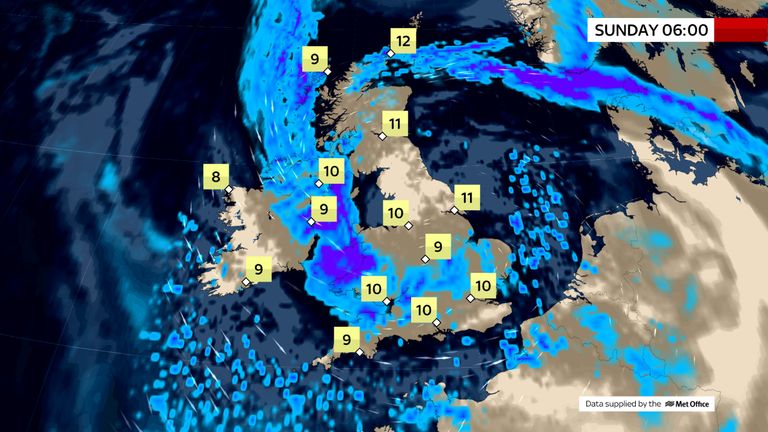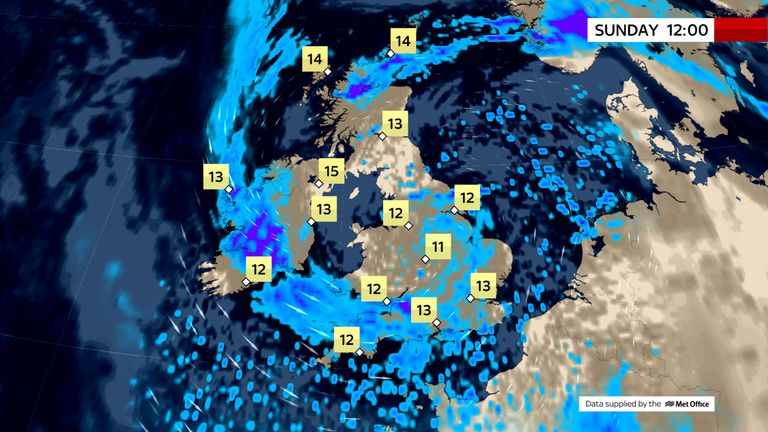
The UK has announced more than 10,000 daily coronavirus cases for the first time since mass testing began.
There were 12,872 new cases, while a further 49 people have died within 28 days of testing positive for Covid-19.
However, the government said a technical issue meant some cases this week were not recorded at the time so these were included in Saturday's data.
It comes after data earlier this week had suggested infections may be rising more slowly than in previous weeks.
That data was based on weekly testing among a sample of people in the community to get an idea of how many people in England have the virus at any time.
The government also closely watches the daily number of positive cases, as it provides the most up-to-date snapshot.
However, it published a cautionary message on its "data dashboard", explaining that the totals reported over the coming days would include some cases from the previous week, "increasing the number of cases reported".
A Department of Health spokesman said the issue did not affect people receiving test results, and all those who tested positive have been informed in the normal way.
The announcement of the apparent glitch in the daily count comes "at an awkward moment", according to BBC health editor Hugh Pym, "when there is intense scrutiny of daily Covid-19 data as ministers and health chiefs try to assess the rate of spread of the virus".
He added: "After criticism in recent months over the way total tests are counted, ministers and officials will now face more questions over the compilation of daily case data."
The daily total saw a significant rise from 4,044 on Monday to a then-high of 7,143 on Tuesday. However, over the next four days the daily total remained stable - varying between 6,914 and 7,108 - at a time when continued increases might have been expected.
And then came the big leap in numbers announced on Saturday, a far bigger day-on-day increase than at any time in the entire pandemic, which were announced five hours later than the usual time and were accompanied by the government explanation.
The figures announced on Saturday would also have been partially inflated by the fact that 264,979 tests were processed the previous day, the third highest there has been so far in a single 24-hour period.
Saturday's figure brings the total number of recorded cases in the UK to 480,017.
The increase in the UK is largely reflected across Europe.
- On the same day, France recorded 16,972 new cases - a new daily high for the country
- The Netherlands and Belgium respectively announced 3,967 and 3,175 new positive results, also new highs in both countries
- Meanwhile, Russia, which has the biggest population in Europe, recorded 9,859 cases - its highest level since May
On Saturday tighter restrictions came into force in parts of northern England after a spike in coronavirus cases.
It is now illegal to meet people indoors from other households in the Liverpool City Region, Hartlepool, Middlesbrough and Warrington.
It means than a third of the UK is now under heightened restrictions.
They were also tightened up this week in Newcastle, Northumberland, Gateshead, North Tyneside, South Tyneside, Sunderland and County Durham, as well as four areas of north Wales.
The new rules come as hundreds of Northumbria University students are self-isolating after testing positive for Covid.
Elsewhere, people arriving in the UK from Turkey and Poland now have to quarantine for two weeks.
The new rules - which also apply to the Caribbean islands of Bonaire, St Eustatius and Saba - came into force at 04:00 BST on Saturday.
After a steady decline since the first peak in April, confirmed coronavirus daily cases in the UK have been rising again since July, with the rate of growth increasing sharply from the end of August.
Sage, the body which advises the UK government, say it is still "highly likely" the epidemic is growing exponentially across the country.
Their latest R number estimate - indicating how fast the epidemic is growing or falling - rose to between 1.3 and 1.6.
But an Office for National Statistics (ONS) survey estimates there were 8,400 new cases per day in England in the week to 24 September - slightly down on the previous week's estimate of 9,600 daily cases.
The ONS's estimates of how much of the population is currently infected are based on testing a representative sample of people in households with or without symptoms.
It is different to the number published daily by the Department of Health. That records positive cases in people with potential Covid symptoms who request tests.
https://news.google.com/__i/rss/rd/articles/CBMiKmh0dHBzOi8vd3d3LmJiYy5jby51ay9uZXdzL2hlYWx0aC01NDQwNDU2MdIBLmh0dHBzOi8vd3d3LmJiYy5jby51ay9uZXdzL2FtcC9oZWFsdGgtNTQ0MDQ1NjE?oc=5
2020-10-04 04:14:47Z
52781100308025



